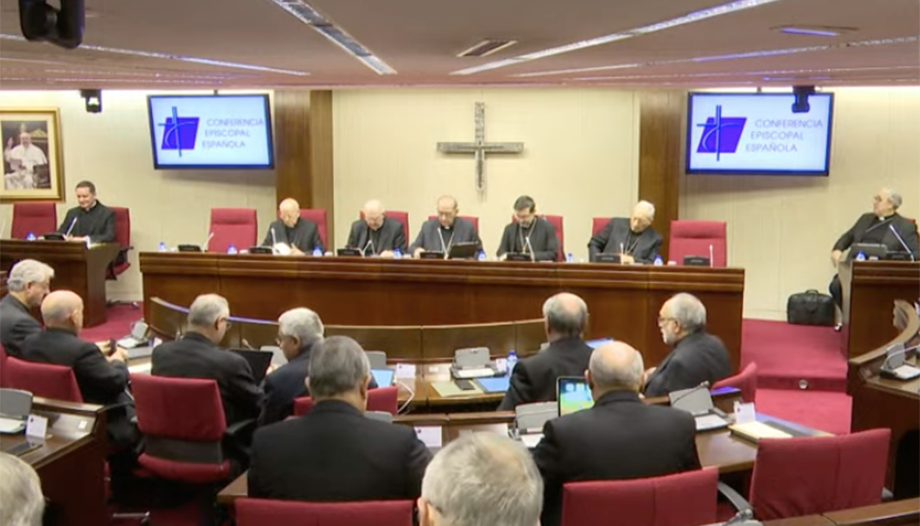The Spanish Episcopal Conference begins its 124th plenary assembly. The inaugural speech of this meeting of the Spanish bishops has given the starting signal for an assembly from which a new leadership of this institution will emerge.
Juan José Omella is leaving this presidency because, according to the new bylaws, he is not eligible for re-election due to his age (he is not eligible for election if he is over 75 years of age at the time of the vote and is "strongly urged" not to reach this age during his term of office).
The Archbishop of Barcelona addressed his last speech stressing that, in the years he has been at the head of the EEC, he has tried to "share a reflective look at reality, encouraging to work together to build, among all, a freer, more just, more peaceful society". Omella focused his last words especially on the task of pastors: priests and bishops.
To elect a president without "interests and strategies
Bishop Juan José Omella emphasized the "mission of promotion and coordination in close collaboration with priests and deacons" that bishops have and that they can only carry out "if we walk united to God and in communion with one another".
He also made a call to the service of those who will head the Spanish bishops in the coming years and appealed to the "sacramental brotherhood, ranging from mutual acceptance and consideration to the attentions of charity and concrete collaboration" in the exercise of these positions.
In view of the imminent election of the presidency of the Spanish bishops, the Archbishop of Barcelona also stressed that this exercise must be done "with an eye exclusively to the greater good of the people of God" and not following "our own interests and strategies".
In the field of advertisements, recalling the Year of Prayer proposed by Pope Francis in preparation for the Jubilee 2025, the hitherto president of the Spanish bishops announced that "the EEC, through the Biblioteca de Autores Cristianos (BAC), is collaborating with the Dicastery for Evangelization in the edition and dissemination of the eight-volume collection entitled Apuntes sobre la oración" (Notes on Prayer).
The election of the new president
78 bishops have the right to vote in this Plenary Assembly. A number that has changed almost by surprise in the last few days, since, although in the briefing In the previous Plenary Meeting held on Thursday, February 29 at the EEC with journalists, 79 electors were indicated, the Archbishop Emeritus of Madrid and, until today, Vice-President of the Spanish Episcopal Conference, Carlos Osoro maintained his right to vote as ordinary for the Eastern Catholic faithful residing in Spain. This situation changed the following day with the appointment of Cardinal José Cobo, Archbishop of Madrid for this task, which leaves Osoro out of the electors in this Plenary.
Following the line marked by the statutes, there are 49 bishops who can be elected to the position of President of the Spanish Episcopal Conference, since only titular bishops who have not resigned can be elected; that is, those under 75 years of age. In addition, it is advisable, although not obligatory, that the elected president does not reach the age of majority during the time he holds the office.
The election of the president is scheduled for Tuesday, March 5 and, if all goes well, the name of the person who will preside over the Spanish bishops for the next four years will be known at noon.
Other Plenary topics
Although the election of the top government officials is the main focus of these days, there are also other work topics that the Spanish bishops hope to address during the five-day plenary meeting.
The bishops will once again discuss the plan of comprehensive reparation for victims of sexual abuse in the ecclesiastical sphere and also the pastoral situation of migrants arriving in our country.
Another of the topics they hope to address is the concretization of the indications received last November in Rome from the Spanish seminaries and which, at the time, the bishops agreed to coordinate through Bishop Jesús Vidal.
As the note distributed by the Episcopal Conference at the beginning of this 124th plenary assembly states, the topics to be discussed also include "the presentation of the new initiatives to be carried out on the occasion of the second session of the XVI Ordinary General Assembly of the Synod, next October. And the preparations for the Congress on Vocation Ministry, scheduled for February 2025.
Two other topics are in the chapter on information, the current state of the Apse group (TRECE and COPE) and those presented by the Secretariat for the Support of the Church".








